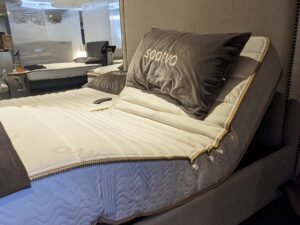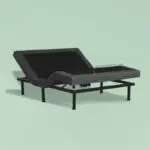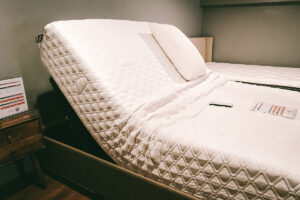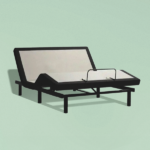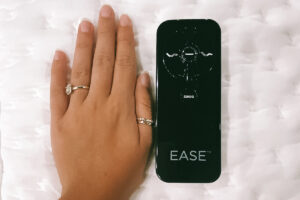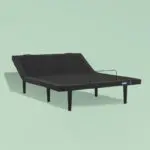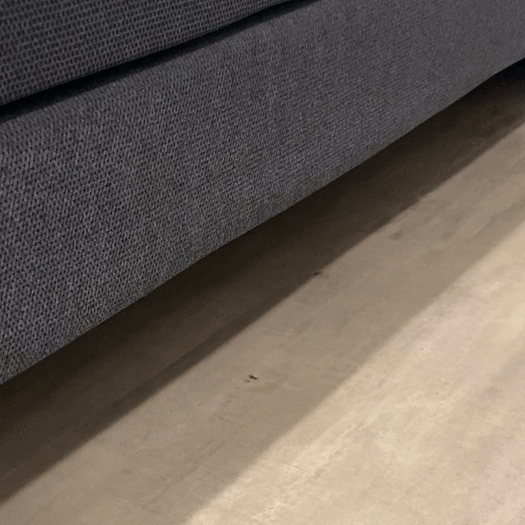Table of Contents
- The best adjustable bed for seniors depends heavily on individual needs and preferences. Overall, we recommend the Saatva Adjustable Base Plus for its mobility-friendly features, affordable price range, and white glove delivery options.
- Older adults seeking an adjustable base should prioritize features like easy-to-use adjustments, preset positions, varying leg heights, and lumbar support.
- Adjustable beds typically cost between $300–$7,000, depending on the brand, size, and features. The adjustable beds we reviewed range from $899–$3,596.
Most of us don’t require less sleep as we age, yet up to 34 percent of adults older than 60 have difficulty falling and staying asleep. Research says multiple factors influence our sleep, but medical conditions and decreased activity levels are among the most common with age. Many of these factors are within our control, like exercising during the daytime to regulate our circadian rhythm or changing our sleep position to alleviate pain or snoring. Simple changes can improve your sleep, and in turn, improve your physical and mental health. That’s because sleep plays an essential role in regulating pain, improving mood, and even reducing the risk for neurologic diseases (like dementia).
“Establishing healthy sleep habits to support our mental well-being is critical,” says Rachel Ragsdale, founder and owner of Braincode Centers and board-certified in neurofeedback. “This includes maintaining a consistent sleep schedule, practicing a relaxing bedtime routine, and creating a sleep-friendly environment.” For some, creating a better sleep environment could involve changing your sleeping surface with a new mattress, pillow, or adjustable base.
Our Handbook Team surveyed 600 adjustable bed owners and found that more than 90 percent of older adults slept better after purchasing an adjustable bed, regardless of their health status. After exploring what makes an adjustable bed beneficial, we listed our top five picks to help you sleep and feel better: Saatva is our “Best Overall”, but we recommend four other brands that may work for you.
Which best adjustable bed for older adults is right for you?
- Saatva: Best overall for features and cost
- Nectar: Most desired presets
- Puffy: Best trial period
- Sealy: Most affordable
- Tempur-Pedic: Best for chronic medical conditions
What you need to know about our adjustable bed research and testing
Here are the five most important things to know about adjustable beds for older adults.
Our testing experience



The Handbook Team mystery shopped in showrooms and third-party retailers, testing each adjustable bed’s features and interacting with in-store clerks. We evaluated brands and models by recording our findings on a 36-question standardized testing form to identify standout features and services, document issues with each product, and describe our shopping experience. For example, we recorded:
- Adjustment speed, noise, and feel.
- Massage modes, intensities, and quality.
- Customer service experience and general satisfaction.
We paid close attention to specific considerations that older adults seek, as identified by respondents in our survey of 600 adjustable bed owners. This included price, features, and discounts. We also interviewed real people to better understand what makes an adjustable bed a worthwhile investment.
According to our survey
According to our survey, about 93 percent of all respondents age 54 and older reported they sleep better with their adjustable base, and 55 percent noticed improved mental health.
As our testers evaluated each brand and its features, we considered why many older adults choose an adjustable bed in the first place. While about 47 percent shopped for an adjustable bed for general comfort, 53 percent required one for a specific medical issue. The most common were chronic pain, snoring, insomnia, and acid reflux. Remarkably, almost all adjustable bed owners with one of these conditions experienced improved sleep after purchase. We consulted sleep experts, physical therapists, occupational therapists, and pain specialists to understand what adjustable beds offer that make an overwhelmingly positive impact.
In order to focus on the adjustable bases themselves, we structured our test designs so they isolated the bases and judged them on criteria independent of the mattress. For example, we tested the capabilities of the adjustable bases, such as positioning options, that are the same no matter what mattress you use. It’s important to note that certain criteria like mattress firmness will have an impact on your comfort, but we strategically organized our test designs to focus on the comfort of the adjustable base regardless of what mattress you have.
Lastly, we compared warranty lengths, trial periods, and white glove delivery (in-home delivery and setup) options. While most brands offer warranties, not all are comprehensive. And many brands on the market don’t have trial periods or free white glove delivery. This could be a deal-breaker if you’re nervous to invest in a healthier sleeping environment because you’re worried the bed won’t get set up properly or offer what you need.
From our tester
“During our testing, we realized that a brand’s warranty, trial period, and white glove delivery options really show how devoted it is to the customer.”
Learn more about our adjustable bed review methodology.
Compare the best adjustable beds for seniors of 2024
| Price range | $1,045–$2,598 | $1,399–$2,798 | $1,199–$2,099 | $899–$1,798 | $899–$4,798 |
| Warranty (years) | 15–25 | 3 | Lifetime | 25 | 25 |
| Trial period? (nights) | No | 50 | 101 | No | No |
| White glove delivery? | Yes, free | Yes, $199** | No | Yes, free | Yes, free |
*Some sizes are not available in certain models
**The white glove delivery offer frequently changes, so check with customer service to make sure it’s available for your order
The best adjustable beds for older adults
1. Saatva: Best overall
Our final verdict on Saatva
The Saatva Adjustable Base Plus is the most reputable choice for seniors because it offers the most important considerations identified by our survey respondents, including price, white glove delivery, available discounts, and mobility-friendly features. Saatva offers a comprehensive selection of features and sizes designed to enhance bed mobility and address sleep issues like acid reflux and snoring.
2. Nectar: Most desired presets
Our final verdict on Nectar Premier
The Nectar Premier has the most presets of any model, making it a convenient choice for people who spend time reading and lounging in bed. We also love that you can save custom positions for one-touch positioning without having to adjust pillows.
3. Puffy: Best trial period
Our final verdict on Puffy
Puffy offers a 101-night trial period, while many other brands we’ve tested are final sale, making this base the least risky option for those who are nervous to commit. You can preset two of your favorite positions on the remote for one-touch positioning. Plus, it hits a sweet spot with its price range, often featuring promotions that make it even more affordable—a great deal for anyone looking to invest in a quality adjustable bed without breaking the bank.
4. Sealy: Most affordable
Our final verdict on Sealy
The Sealy Ease adjustable bed is the most budget-friendly option for people who need free in-home setup and simple adjustability without extra features that increase the price. It’s also equipped with straightforward controls and essential adjustment features, making it incredibly user-friendly for anyone needing basic comfort enhancements without the complexity of additional features.
5. Tempur-Pedic: Best for chronic conditions
Our final verdict on the TEMPUR-Ergo Smart Base
The TEMPUR-Ergo Smart Base offers more features to address pain, snoring, and overall sleep quality than any other adjustable bed on the market. But this model comes at a higher price range than other brands ($1,899–$3,798). We’re impressed with the specialized lumbar support that caters to those with chronic back pain and the incorporated sleep-tracking technology that allows users to monitor and improve their sleep quality over time. These features make it an excellent choice for individuals seeking to enhance their sleep environment and manage chronic health issues effectively.
Handbook Team Tip #1
You can find many adjustable bases at third-party retailers, like Mattress Firm, but we discovered that these retailers replace warranties and trial periods with their own. For example, if you purchase a Tempur-Pedic base at a Mattress Firm, your 25-year warranty is replaced with the retailer’s five- to 10-year warranty. It’s better to shop from the brand directly.
Pros and cons of adjustable beds for older adults
What we like
- Plenty of options to address your needs: The adjustable bed industry offers many brands and models with a plethora of features that improve sleep, mobility, brain health, and emotional wellness. Many brands offer different sizes of adjustable beds to best fit your needs, from twin to split king.
- Customers truly benefit: Regardless of health status, about 93 percent of seniors in our survey reported improved sleep after purchasing an adjustable base. More than half reported improved mental health as a result.
What we don’t like
- It’s an overwhelming industry: Focus group participants agreed that shopping for an adjustable bed is confusing and frustrating because there are too many options. Which features do you actually need? Who can you trust to give you the best answer? The Handbook Team is here to help, but your doctor can provide more specific recommendations when you’re unsure what to look for.
- Few brands offer trial periods: Other than price, fear is a big obstacle when considering an adjustable bed. It’s usually a final-sale purchase, which means you can’t return it if you’re not benefitting from your thousand-dollar investment. Our team includes many brands with trial periods in our reviews because we believe beds are a big commitment, and you should feel confident in a life-changing purchase.
Cost of adjustable beds
Handbook Team Tip #2
Unfortunately, insurance is unlikely to cover the cost of an adjustable bed. Medicare Part B might cover an adjustable bed if it’s medically necessary as deemed by your doctor, but it needs to qualify as a pressure-reducing surface or hospital bed.
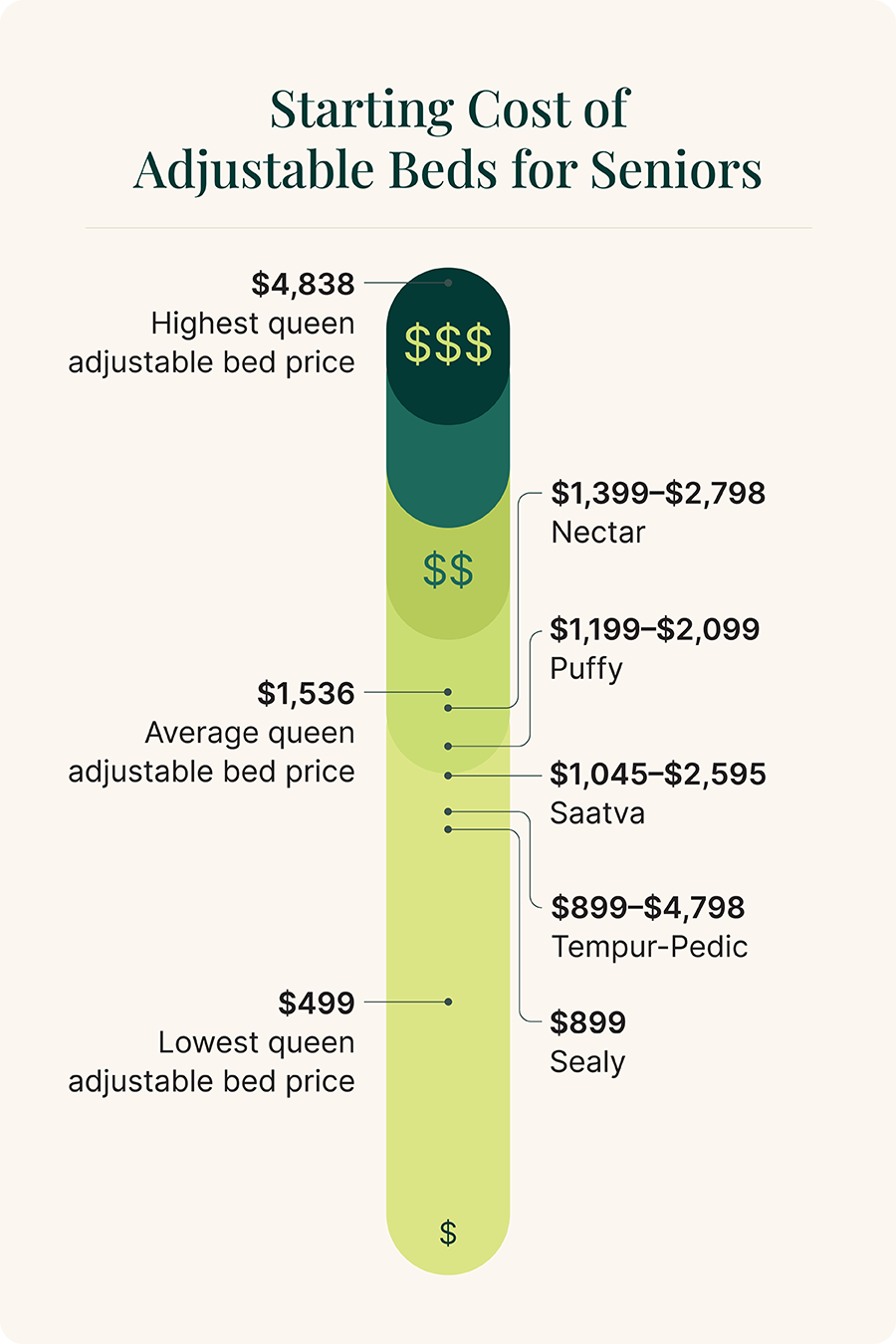
Adjustable beds cost between $300–$7,000 depending on the brand, size, and features. This review recommends brands with models that start below $2,000 to fit most people’s budgets.
Saatva is the only brand that discounts adults 65 and older, but don’t forget to look into other savings opportunities. If you’re a military veteran, you qualify for discounts with Saatva and Nectar. And if you’re not yet retired, first responder, health care professional, and educator discounts are also available. The best place to look for discounts on a brand’s website is by scrolling all the way to the bottom.
Also, remember that online prices fluctuate. Brands have frequent promotions, especially around holidays, that reduce costs by a few hundred dollars.
Most brands offer at least one financing option. Sometimes, it’s through a third-party lender, like Klarna or Affirm. You can prequalify on most brands’ online product pages or wait to qualify at checkout. Be aware that third-party lenders can charge up to 35 percent interest based on your credit history.
Hospital bed vs adjustable bed
Seniors debating between hospital beds and adjustable beds may find one or the other meets their needs more effectively. Adjustable beds make it easy to customize a sleep position, but hospital beds are likely a better option for older adults who are receiving regular care. Hosptial beds offer additional features, such as handrails and specialized mattresses designed to evenly distribute pressure to minimize the potential for bedsores.
Hospital beds also have wheels, which make them easier to move around. They qualify as durable medical equipment, so they may be eligible for insurance coverage. One drawback to hospital beds is the limited size options. While adjustable beds come in a range of sizes, hospital beds are generally only available in a twin.
Key features to look for in adjustable beds
Below are the most important features to consider when looking for an adjustable bed. These are based on survey results, focus group responses, tester insights, and expert recommendations.
We acknowledge that not all older adults have the same needs, so we encourage you to create your own list based on these suggestions and your unique circumstances.
Easy-to-use adjustments
Our team found that the best adjustable beds do basic functions well. Always prioritize:
- Straightforward remote controls that are clearly labeled.
- Smooth adjustments with a one- to two-second response lag to avoid jerking movements.
- Whisper-quiet motors that won’t wake a partner in the middle of the night.
- Quick adjustment times that only take 20–30 seconds to reach maximum elevations.
Preset positions
Presets are factory-set remote buttons that adjust your position in one press. These are the most popular features among seniors in our survey because they’re convenient, especially for people with dexterity issues or arthritis of the hand and fingers. The most common presets include:
- Flat: Returns you to a flat sleeping position.
- Zero gravity: Elevates the head and legs so the legs are above the heart, placing your body in a cradled position that can help relieve pressure and that some may find relaxing.
- Anti-snore: Elevates the head of the bed around 10–20 degrees (depending on the brand) to alleviate snoring by opening the airway and offloading gravity’s pressure on the chest, particularly for those with sleep apnea or chronic obstructive pulmonary disease (COPD).
- Reading or TV: Raises the head of the bed 60 degrees or higher to a near-sitting position.
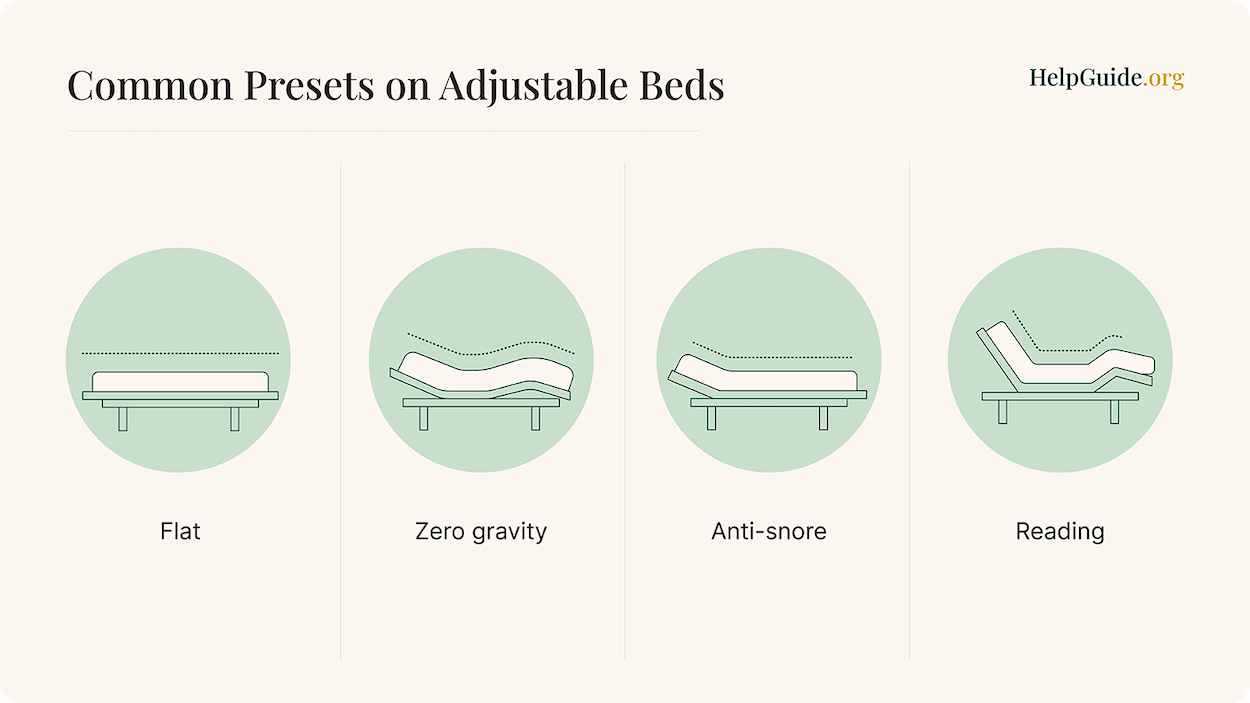
Handbook Team Tip #3
According to Dr. Trenkle, you can also alleviate snoring or mild sleep apnea by sleeping on your side, losing weight, or avoiding alcohol before bed. However, those with obstructive sleep apnea may benefit from a continuous positive airway pressure (CPAP) device to better alleviate symptoms, so it’s important to consult your doctor. Untreated breathing-related sleep disorders can affect how you think and function, leading to serious conditions like dementia.
Varying leg heights
Most beds offer different leg heights, but you need to select the height during setup. Selecting the right leg height is especially important for older adults with leg weakness, joint pain, or balance issues. Some people need:
- Higher leg heights to reduce effort when getting out of bed.
- Lower leg heights to reduce the risk of falls from a tall surface.
Don’t forget to account for the mattress height and base thickness when you’re setting up your base. You may want to try standing from different surfaces around the house to see what feels most comfortable before committing to a height setting.
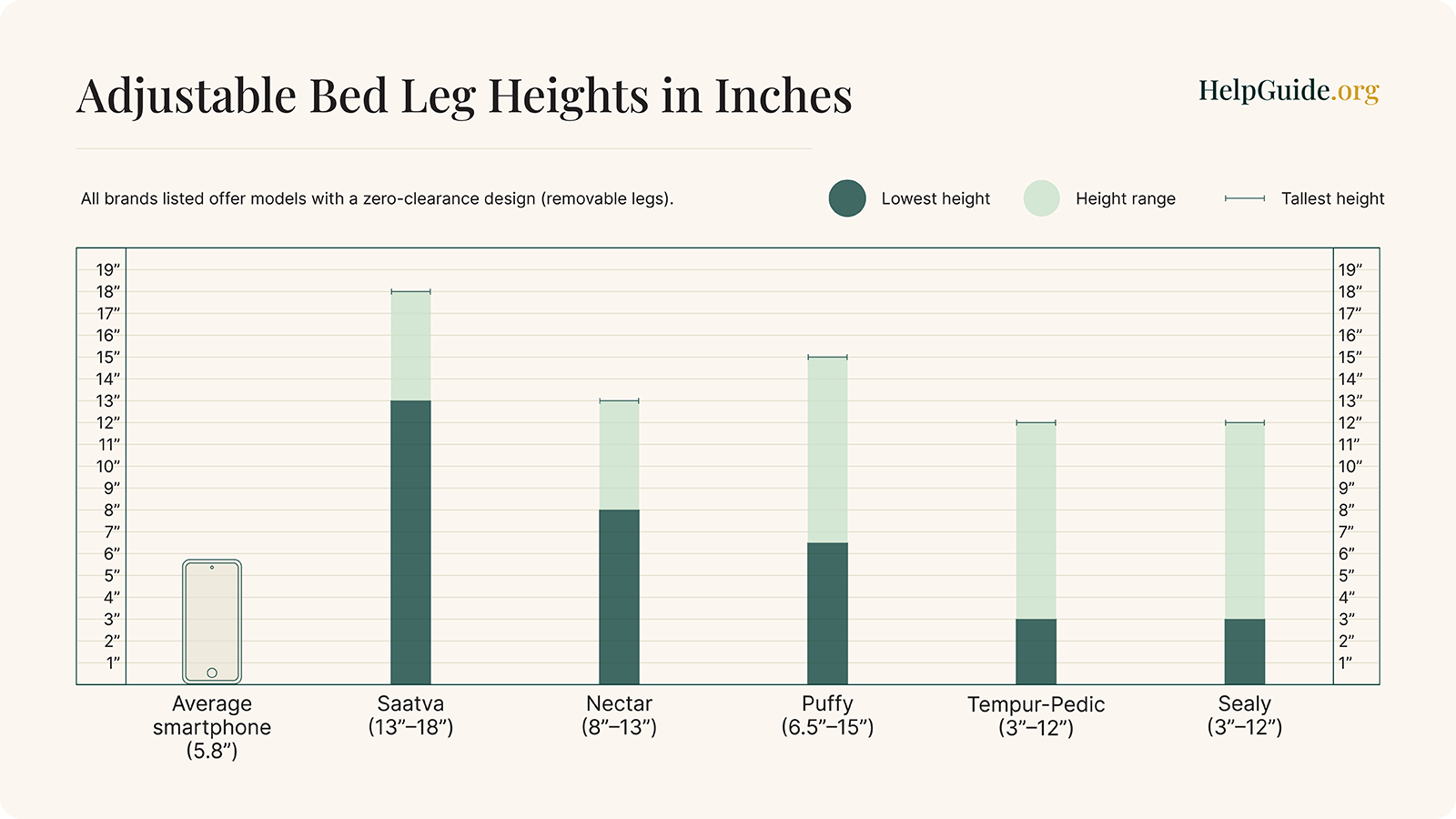
Custom presets
Custom or memory presets are unprogrammed buttons that you can set to your favorite positions. Our team noticed that the most comfortable positions were the ones we set ourselves since everyone has unique preferences. Many older adults in our survey agreed, listing it as the fourth-most important feature to consider.
Under-bed lighting and built-in remote flashlight
Most people don’t think of built-in lighting when shopping for an adjustable bed, but it’s critical when it comes to safe nighttime mobility. Research shows that most falls resulting in an emergency room visit occur in the bedroom, but you can prevent this by improving bedroom lighting and decluttering your space.
The Handbook Team highly recommends older adults prioritize beds with under-bed lighting and a flashlight function in the remote to illuminate obstacles in your bedroom. If the bed’s lighting isn’t enough, you may also want to buy motion-activated night lights along your walkways.
Handbook Team Tip #4
Our team found that thick bed frames can block under-bed lighting almost completely. Opt for a thinner build if you’d like to use a decorative bed frame with your adjustable base.
If you find yourself visiting the bathroom frequently through the night, we recommend talking to your doctor. Overactive bladders and prostate issues are more common with age, but they’re treatable, so you can sleep soundly and reduce your nighttime trips to the bathroom.
Optional features to look for in adjustable beds
Lumbar support
Many older adults in our survey identified lumbar support as a primary feature, opting for Tempur-Pedic or Sleep Number beds with adjustable components to reinforce the lower back. While adjustable lumbar support could be a great feature for people with chronic back pain, it also comes at a premium of at least a few hundred dollars. Our testers learned that this support should primarily come from your mattress instead.
Wall alignment
The Saatva Adjustable Base Plus offers wall alignment, which shifts the bed towards the wall as the head elevates. This keeps you close to your nightstand so you don’t have to reach as far, but our team found that this feature doesn’t make a difference for people with smaller builds. It’s a good feature to support safer mobility for people who can’t reach far without feeling unstable, but it’s not a groundbreaking innovation that helps everyone the same.
Skip the massage feature
Most adjustable beds offer massage settings that can help some people relax and unwind. However, older adults didn’t list massage as one of the most important features in our survey.
Our testers understand why. Rather than a kneading massage you’d expect from a massage chair, adjustable bed massages feel more like vibrations at different frequencies, which can sound loud and feel annoying.
Beds with lower massage frequencies and intensities were more enjoyable for us, like some BedTech and Mattress Firm models, but our testers agreed we would’ve skipped the feature if we were shopping for ourselves.
Sleep Number store representatives told our team they removed massage from their models completely because customers simply don’t use it.
Brand-specific services to consider
If you’re stuck choosing between multiple brands that offer the features you need, compare each brand’s warranty, trial period, and white glove delivery options.
- Warranty: Most adjustable bed brands offer limited warranties ranging from three years to a lifetime. If you want a long warranty, consider brands with at least 20 years of coverage, like Saatva or Puffy. But if you want a comprehensive warranty that covers accidental damage from pets or movers, purchasing Nectar’s extended 10-year warranty is your only option.
- White glove delivery: Also known as in-home setup, white glove delivery is the second-most important consideration when purchasing an adjustable bed. These heavy products are hard to haul into your bedroom and set up properly on your own. We love that Saatva and Tempur-Pedic offer this as a complimentary service, but other brands like Sleep Number charge up to $249.
- Trial period: Our team favors brands with trial periods because an adjustable bed is a life-changing purchase, and you should feel confident that you’re investing well in your health. Unfortunately, the industry standard is to exclude trial periods. But some brands go above and beyond, allowing you to test your bed at home for up to 120 nights.

Our final verdict
Our team agrees that Saatva is the best overall for older adults, providing an impressive lineup of features and free in-home setup to all customers. We think Nectar is a top-runner because it offers the most desired presets and a trial period, but its white glove delivery is inconsistently offered and costs an extra $199. If you’re uncertain about purchasing an adjustable bed, our team recommends Puffy to try at home for 101 nights. And if you’d prefer something more affordable, Sealy is a high-quality option starting below $1,000.
Tempur-Pedic is the best-equipped adjustable bed brand for chronic conditions, like low back pain and sleep apnea, but make sure to consult your doctor. Adjustable beds help many people sleep better, but it’s not the first line of treatment for every condition. Talk to a health care professional who can provide tailored recommendations unique to your circumstances so you can best protect your physical, cognitive, and mental health.
Frequently asked questions
Medicare Part B may cover an adjustable bed if it’s medically necessary as deemed by your doctor, but it needs to qualify as a pressure-reducing surface or hospital bed.
Our survey found that more than 90 percent of older adults who bought an adjustable bed reported improved sleep. While results depend on the person, we feel confident that adjustable beds meet most older adults’ needs.
If you’re an older adult who finds it difficult or painful to stand from low surfaces, Saatva offers 18-inch leg heights that raise the surface to make standing easier. However, there are instances where lower surfaces are safer. Some older adults with mobility issues are at risk for falls when getting out of bed, so a lower surface can protect them better than a high surface.
Adjustable beds are costly, and many brands don’t offer trial periods. While rare, people who don’t benefit from the adjustability might regret the extra expense over a regular bed.
- Albarqouni, L., Moynihan, R., Clark, J., Scott, A. M., Duggan, A., & Del Mar, C. (2021). Head of bed elevation to relieve gastroesophageal reflux symptoms: A systematic review. BMC Family Practice, 22(1-9). Link
- Carroll, J. E., & Prather, A. A. (2021). Sleep and biological aging: A short review. Current Opinion in Endocrine and Metabolic Research, 18, 159–164. Link
- Durable medical equipment (DME) coverage. (n.d.) Medicare. Link
- Fong, J. H. (2019). Disability incidence and functional decline among older adults with major chronic diseases. BMC Geriatrics, 19(1). Link
- Gulia, K. K., & Kumar, V. M. (2018). Sleep disorders in the elderly: A growing challenge. Psychogeriatrics, 18(3), 155-165. Link
- HelpGuide Handbook. (2023). HelpGuide: Adjustable Beds. [600 respondents]. Pollfish.
- Hospital beds. (n.d.) Medicare. Link
- Ioachimescu, O. C., & McNicholas, W. T. (2022). Chronic obstructive pulmonary disease–obstructive sleep apnea overlap: More than a casual acquaintance. American Journal of Respiratory and Critical Care Medicine, 206(2), 139–141. Link
- Moreland, B. L., Kakara, R., Haddad, Y. K., Shakya, I., & Bergen, G. (2020). A descriptive analysis of location of older adult falls that resulted in emergency department visits in the United States, 2015. American Journal of Lifestyle Medicine, 15(6), 590–597. Link
- National Institute on Aging. (2022). Urinary Incontinence in Older Adults. Link
- Scott, A. J., Webb, T. L., Martyn-St James, M., Rowse, G., & Weich, S. (2021). Improving sleep quality leads to better mental health: A meta-analysis of randomised controlled trials. Sleep Medicine Reviews, 60, 101556. Link


















